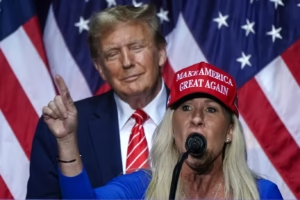Homeland Security Secretary Kristi Noem’s Visit to El Salvador Prison Sparks Immigration Debate
Homeland Security Secretary Kristi Noem recently visited El Salvador’s Terrorism Confinement Center (CECOT), one of the most secure prisons in the world. The facility currently holds hundreds of Venezuelan migrants who were deported from the U.S. under the Alien Enemies Act of 1798. This visit underscores the Trump administration’s strict immigration enforcement policies and has sparked global debate regarding human rights, due process, and international law.
Understanding the Alien Enemies Act and Its Implications
The Alien Enemies Act of 1798 was originally designed to expel foreign nationals from countries hostile to the U.S. However, the Trump administration has revived it to justify the deportation of Venezuelan migrants, claiming links to the Tren de Aragua criminal organization.
However, critics argue that the Act lacks modern legal scrutiny, and many of those deported may have no actual ties to criminal organizations. This has led to widespread legal battles over the legitimacy of using this outdated law.
| Key Points | Details |
|---|---|
| Law Enacted | 1798 |
| Current Application | Deporting Venezuelan migrants under suspicion of criminal ties |
| Controversy | No need for solid evidence before deportation |
| Legal Challenges | Cases pending in U.S. federal courts |
Inside El Salvador’s CECOT Prison: Extreme Conditions
CECOT is one of the world’s largest and most secure prisons, with a capacity for 40,000 inmates. Initially built to house dangerous gang members, it is now detaining hundreds of Venezuelan migrants, many of whom claim they were unjustly deported. Reports from human rights organizations reveal harsh conditions, including:
- Severe overcrowding with up to 100 detainees per cell
- Limited access to legal aid, making it difficult for detainees to contest their deportation
- Harsh treatment, including allegations of physical abuse and restricted food rations
- No medical assistance, raising concerns over detainees’ health conditions
Many detainees claim they have been placed among hardened criminals without proper screening, raising human rights concerns.
Secretary Noem’s Visit and Its Message to Migrants
During her visit, Secretary Kristi Noem stood before rows of heavily tattooed inmates, sending a clear message about the consequences of attempting to enter the U.S. illegally. She emphasized the administration’s zero-tolerance approach to illegal immigration, urging potential migrants to think twice before attempting unlawful crossings.
However, some legal analysts argue that this strategy could criminalize individuals without substantial evidence, potentially violating international human rights agreements.
The Legal Battle: Deportation vs. Human Rights
The deportation of Venezuelans has triggered multiple lawsuits in U.S. federal courts, with advocacy groups challenging the legality of these deportations. The main legal concerns include:
- Lack of Due Process – Many deportees were not given a chance to defend themselves before removal.
- Questionable Use of the Alien Enemies Act – Critics argue that this 200-year-old law does not fit the modern legal framework.
- Human Rights Violations – The conditions in CECOT prison raise concerns over cruel and inhumane treatment.
A recent federal appeals court ruling temporarily blocked further deportations, stating that the legal foundations of this policy require deeper examination. The next court hearings are expected to set a precedent for future immigration policies.
Global Reactions and Future of U.S. Immigration Policy
International Concerns
- Latin American governments have condemned the deportations, warning of strained U.S.-Latin America relations.
- Human rights groups have filed complaints with the United Nations over potential violations of international asylum laws.
- U.S. lawmakers are divided—some support strict border security, while others demand comprehensive immigration reforms.
What’s Next?
As the 2025 presidential elections approach, immigration policies remain a central issue. Future policies will determine whether the U.S. continues using strict deportation measures or shifts toward more humane immigration solutions.
Conclusion: The Bigger Picture of Immigration Enforcement
Secretary Noem’s visit to El Salvador’s CECOT prison has intensified debates over immigration policy, human rights, and legal fairness. While the administration claims these deportations enhance U.S. national security, critics argue that they may violate basic legal protections for migrants.
As the legal battles continue, the fate of deported Venezuelans remains uncertain, with many calling for a review of current immigration enforcement strategies. The decisions made in the coming months will have long-term effects on U.S. immigration policy and international relations.





